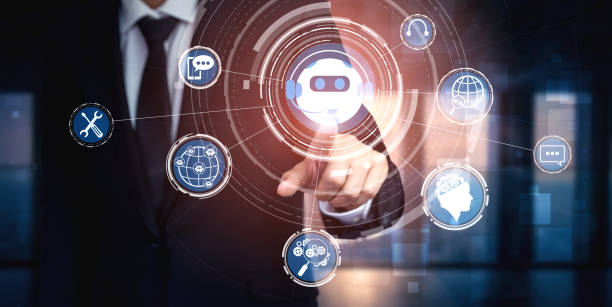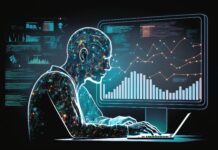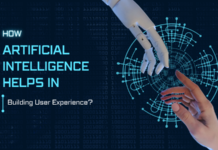
For the past few decades, more and more technological developments have occurred in today’s fast-paced world. As a result, the requirement to act and react to applications and make better business decisions has grown over time. Artificial intelligence machines are undoubtedly the most effective components of computer science today, contributing significantly to the world.
In recent years, AI implementation has exploded, resulting in a plethora of online and offline courses for students to choose from. The goal of AI courses is to teach people the principles of AI as well as theoretical knowledge in the subject.
What is Artificial Intelligence, and how does it work?
In 1956, the term “artificial intelligence” became popular. Over time, though, AI has become the more usable phrase. In today’s world, artificial intelligence is the most effective discipline of computer science. It successfully completes all jobs, all of which necessitate the use of human intelligence as the major source of energy. The basic goal of AI machines is to analyze and understand past human experiences in order to learn from them and avoid making the same mistakes in the future.
It’s possible that it’s a machine-operated intelligence that contradicts the term “natural intelligence.” Some people refer to robots that can replicate human intellect as “cognitive” systems that can run in tandem with human intelligence.
They can also analyze more data and gain a deeper understanding in less time. As a result, they are able to come up with quick and distinctive solutions to a variety of business problems. Artificial intelligence is used by most internet services, like Instagram, Linkedin, Facebook, and Twitter, to produce better organized and well-thought-out recommendations. Amazon, Myntra, Flipkart, and other well-known shopping applications make extensive use of artificial intelligence to provide better recommendations to their users.
How does artificial intelligence work?
There are various types of AI that are employed in various contexts. Reactive Machines, Limited Memory, Theory of Mind, and Self-awareness are the most common AI techniques. While the first two approaches are widely used, the theory of mind and self-awareness notions are only hypothetically present in the scene.
All AI devices must follow a few basic conceptual processes in order to function properly:
- Thinking like a person: The first and most important stage for all AI machines is to understand human activities, have high evaluating abilities, and have a quick reaction time to circumstances in order to make their own decisions.
- Thinking rationally: AI robots are designed to understand human thought processes and subsequently make rational conclusions.
- Acting in a human-like manner: In order for artificial intelligence robots to act in a human-like manner, they must first watch and learn from human experiences before taking their own actions.
- Human behavior is judged and understood comprehensively by AI operators, who then rationally make business decisions in a faster and wiser manner.
Why do we require artificial intelligence?
The demand for something smarter and faster than people has led to the current level of reliance on artificial intelligence among organizations. The following are some of the most important reasons why AI is required in today’s world:
- Humans are better at repetitive activities than AI computers. When it comes to any type of boring workflow, they are faster and more unique than people in any industry.
- Artificial Intelligence is required for the most well-known online services, such as LinkedIn, Facebook, YouTube, Spotify, Instagram, and Twitter, in order to provide better and more personalized recommendations to their users. Virtual shopping apps like Flipkart and Amazon leverage artificial intelligence to maximize their sales potential in the retail business. Both customers and sellers benefit from the time savings.
- Artificial intelligence is essential for certain smart assistants, such as Siri and Alexa, to function successfully. Simple Google search results are modified by AI learnings, resulting in the niched and appropriate information for the user.
- Artificial machines in the banking industry strive to improve speed, efficiency, and precision. In financial establishments. AI can also tell which transactions are likely to be fraudulent and which are genuine.
AI has the potential to improve the level of living in smart cities in general. Artificial intelligence helps to make predictive maintenance easier. - In the medical industry, AI assists medical practitioners in making rational predictions, which makes their lives easier: AI may assist medical practitioners in a variety of ways, such as reminding them to take their medications, meditate every day, and work out at a specific time, or doing a specific medical checkup for a patient.
- AI can also be used to improve the intelligence of pre-existing items. Artificial intelligence, for example, improves Apple goods, conversational platforms, and other automation tools and services.
- AI also plays a significant part in the industrial industry. With the use of its synchronization power, it assists professionals in maintaining a certain type of data used with sequence data.
Furthermore, one of the most important aspects of AI is the minimization of human mistakes. Because they are machines, they ensure that no response from their end is inaccurate in any situation. They are appropriately programmed and constructed to ensure that no errors are made on their part, regardless of the situation or the field of work in which they are used.
AI Machines’ Limitations:
Although AI machines have the potential to outperform humans in terms of speed, intelligence, and unique work capabilities, they also have some drawbacks.
The main downside is the AI machines’ lack of inventiveness, which can be seen in their performance in every subject. It’s remarkable that they can analyze, comprehend human experiences, and make their own decisions. However, after a given amount of time, their reactions become monotonous and repetitive, demonstrating a lack of inventiveness. When it comes to the topic of whether AI has yet to surpass human intelligence, this is a major concern.
Another challenge that many small business owners confront is the high expenses of implementation. Not every business owner can afford to install AI robots because it necessitates a significant financial investment. Aside from that, many prospective AI professionals may find AI training to be prohibitively expensive. However, AI computers frequently fail to provide appropriate solutions in difficult situations. In repetitious job scenarios, their overall performance is superior.
However, as the rate of AI adoption has increased in today’s society, the concern of more people losing their jobs has grown. Machines are better at performing repetitive software jobs and tedious workouts repeatedly. They also have the ability to do tasks swiftly and accurately, putting human intelligence at a disadvantage in that race.
Conclusion:
Several issues have arisen as a result of rising technological breakthroughs, and AI machines have come to the rescue with their clever and fast-operating system. Despite the fact that they have their own set of problems to deal with, the amount of work they manage to accomplish is commendable and, more often than not, is as effective and well-thought-out as human actions. As a result, today’s world cannot function without artificial intelligence, given how it has improved the overall experience in so many domains.







![How to Fix [pii_email_7e710fffb86b8d1d9420] Error Code? [pii_email_7e710fffb86b8d1d9420]](https://www.techwebtopic.com/wp-content/uploads/2022/02/pii_email_7e710fffb86b8d1d9420.jpg)







